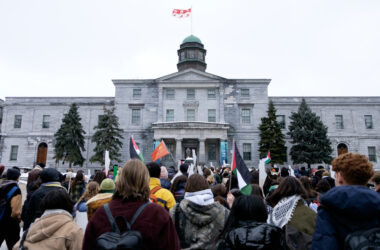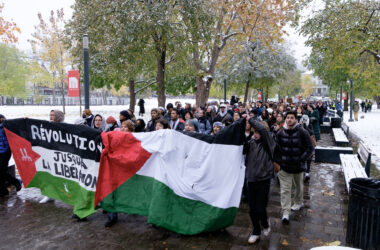Irony’s a funny thing. And whether it’s a minority-elected government preaching democracy to the global south or an American-educated, torture-supporting opposition leader speaking about returning Canada to its place of soft-power prominence in the world, Canadian politics is ripe with irony.
But sometimes irony is too tragic and enraging to be amusing – as it was when I watched our Haitian-born governor general address the tragic calamity that has befallen Haiti. Her words, as always, were touching and beautiful. But the irony of her speaking about rebuilding Haiti for its people was just too much for me to handle.
For you see, the governor general – in addition to being the representative of our government’s colonial roots – is the Head of State, and therefore of the head of the Canadian Armed Forces. The same Armed Forces that have now twice invaded Haiti, aided in the removal of its democratically elected leaders from power, helped install an unpopular puppet ruler, and opened Haiti’s fragile populist economy to pillaging by massive corporations, whether in sweatshops or sugar fields.
Of course, such invasions were couched in humanitarian terms. We, the Canadian public, were told that Aristide – the repeatedly elected populist leader of the country – was becoming a “thug.” Moreover, due to both its origins as a country of freed slaves and its recent decision to pursue a path of development in the interest of its own people rather than foreign corporations, Haiti, we are told, should be considered a “failed state” in need of Western salvation. Never mind the economic growth experienced under Aristide and never mind the billions of dollars in reparations still outstanding to the Haitian population from its former slave-driving colonial overlords.
In other words, without saying so, the message to the public was clear: a country of black people cannot be trusted to choose their own leaders, choose their own priorities, and decide their own futures. And the Canadian media’s response to the horrific earthquake has echoed this mentality. Just like in the wake of Hurricane Katrina, the media coverage on the ground has followed a racist dichotomy: black thuggery and white heroism – be it aid workers or soldiers. Never mind that aid workers have been involved in profiteering off Haiti’s poverty for decades, nor that international armed forces have been accused of massacres. And never mind the countless (black) Haitian grassroots organizations that have been systematically excluded from Western financing. If our media are to be believed – which is never a great idea – we are left with the notion that the “White Man’s Burden” is alive and calling our names.
Of course, there’s a great profit to be made in tragedy, particularly when the interests of multinational corporate giants align with skewed, racialized liberal concern for “those poor people.” In the aftermath of Hurricane Katrina, the city of New Orleans underwent a radical privatization of most of its services, from security forces to formerly-public social housing. Following the Southeast Asian tsunami, massive expanses of traditional fishing coast were handed over to large hotel chains as a part of the “rebuilding” and aid effort. This is what author Naomi Klein has called the “Shock Doctrine” – the newest phase of corporate capitalism, where disaster and calamity are milked for profit to their fullest extent.
So far, privatization, wage freezes, and a return to a submissive and dependent economy have been the precondition for Western aid in the wake of the Haitian earthquake. Before any doctor was sent from the United States to the impoverished and devastated country, 8,000 U.S. Marines were deployed to secure American strategic interests. These Marines have already been accused of prioritizing corporate plunderers over aid organization such as Doctors Without Borders in their control of the country’s airport. Just like Canada’s repeated military interventions in Haiti, right-wing economic policy has been conflated with democracy and aid in the aftermath of the earthquake.
Haiti was the first black nation in the world to free itself from the crippling shackles of colonialism. It is a nation with a history of strength in the face of adversity and independence in the face of calls for submission. In the wake of the devastating earthquake, people on the ground need our support and solidarity. They do not, however, need our neo-colonial yoke strapped over them under the guise of humanitarianism.








